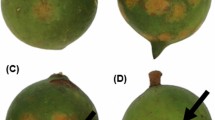Abstract
Bitter flavour of the almond kernel is due to the cyanoglucoside amygdalin and has been the first characteristic considered in breeding programmes. In such programmes, the seedlings from sweet-kernelled parents were used to study the transmission of bitterness, which was shown to be a monogenic characteristic, the sweet flavour being dominant. The aim of this work was to investigate more deeply the inheritance of bitterness in almond, by studying for 2 consecutive years the bitter flavour in 169 seedlings of 9 families (obtained exclusively for this purpose), one or both parents being bitter-kernelled. With the exception of the presence of slightly bitter seedlings, the results support the hypothesis of monogenic inheritance of this trait, the bitter flavour being recessive, although other factors could have a slight influence on the expression of this characteristic. Heterozygous individuals showed sweet, slightly bitter or year-changeable (sweet-slightly bitter) phenotypes. Our results demonstrated the possibility of using as parents bitter-kernelled individuals with some outstanding characteristic desirable for transmission to the progeny, always in combination with a homozygous sweet progenitor.
Similar content being viewed by others
References
Álvarez J (1798) Diccionario Universal de Agricultura. Ed. Imprenta Real. Madrid, Spain
Arrázola G (2002) Análisis de glucósidos cianogénicos en variedades de almendro: implicaciones en la mejora genética. PhD Thesis, Universidad de Alicante, Alicante, Spain
Conn EE (1980) Cyanogenic compounds. Ann Rev Plant Physiol 31:433–451
Dicenta F, García JE (1993) Inheritance of the kernel flavour in almond. Heredity 70:308–312
Dicenta F, Martínez-Gómez P, Ortega E, Duval H (2000) Cultivar pollinizer does not affect almond flavour. HortScience 35:1153–1154
Durán L, Costell E (1998) Review: perception of taste. Physiochemical and psychophysical aspects. Food Sci Int 5:299–309
Frehner M, Scalet M, Conn EE (1990) Pattern of the cyanide-potential in developing fruits. Plant Physiol 94:28–34
Grasselly C (1976a) Les espèces sauvages d’amandier. Opt Méd 32:28–44
Grasselly C (1976b) Origine et évolution de l’amandier cultivé. Opt Méd 32:45–50
Grasselly C, Crossa-Raynaud P (1980) L’amandier. Maisonneuve et Larose, Paris, 446 pp
Heppner J (1923) The factor for bitterness in the sweet almond. Genetics 8:390–392
Heppner J (1926) Further evidence on the factor for bitterness in the sweet almond. Genetics 11:605–606
Kochba J, Spiegel-Roy P (1976) Alnem 1, Alnem 88, Alnem 201 almonds; nematode resistant rootstock seed source. HortScience 11:270–276
McCarty CD, Leslie JW, Frost HB (1952) Bitterness of kernels of almond × peach hybrids and their parents. Proc Am Soc Hort Sci 59:254–258
Rouseff RL, Matthews RF (1984) Nomilin, taste threshold and relative bitterness. J Food Sci 49:777–779
Spiegel-Roy P, Kochba J (1974) The inheritance of bitter and double kernel characters in the almond. Z Pflanzenzuchtg 71:319–329
Spiegel-Roy P, Weinbaum SA (1985) Increasing productivity in sweet almond using selected clones of bitter almond. Euphytica 34:213–217
Vargas FJ, Romero MA, Batlle I (2001) Kernel taste inheritance in almond. Opt Méd 56:129–134
Acknowledgements
This study was financed by projects AGF98-0211-C03-02 and AGL2001-1054-C03-01 of the Spanish Ministry of Science and Technology. We wish to thank Dr. David Walker for revision of the English in the manuscript.
Author information
Authors and Affiliations
Corresponding author
Rights and permissions
About this article
Cite this article
Dicenta, F., Ortega, E. & Martínez-Gómez, P. Use of recessive homozygous genotypes to assess genetic control of kernel bitterness in almond. Euphytica 153, 221–225 (2007). https://doi.org/10.1007/s10681-006-9257-6
Received:
Accepted:
Published:
Issue Date:
DOI: https://doi.org/10.1007/s10681-006-9257-6




